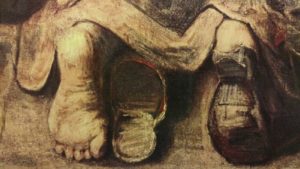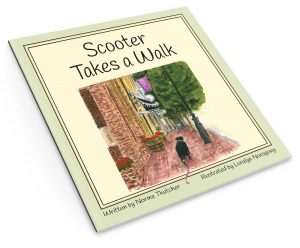
Elmo from Sesame Street is one of those endearing characters who forever stays a little boy, er, monster. I seem to remember that a phrase from one of the earliest versions of the talking toy based on the character was, “Elmo got new shoes!” As you may recall, Elmo frequently referred to himself in the third person.
Hearing “Elmo got new shoes” made me laugh the first ten times I heard it. By the time the count reached twenty, my head began to ache. By the 30th time, this Mommy said, “Elmo needs to take off his shoes and take a nap,” as I removed the battery. Temporarily, of course.
In the parable of the prodigal son, the Bible tells us that the younger son of a rich man asked for his share of a future inheritance early. He then took the money and left to live a lavish, partying lifestyle in a far-off country.
When the money ran out and tough times came upon the land, the son made the long journey home on foot, intending to ask not only for his father’s forgiveness but also for a job on the family farm.
As the son reached the last leg of the trip, his father saw him “when he was still a great way off.” The first words from the father’s mouth were not to his son, but to the servants. “Bring out the best robe…and sandals for his feet.”
Curious instructions, yes? Why, of all possibilities, would the father want new shoes for his returning child?
We can imagine the answer in seeing a portion of Rembrandt’s painting Return of the Prodigal Son.

Remember that the son had walked from a faraway land to return home. All he owned was what he wore. There had been no donkey or horse to ride upon. He walked. And walked. On dirty, dusty roads he walked so long and so far that by the time he arrived, his shoes were likely breaking, just as he himself had already broken.
The son fell to his knees before his father, begging for forgiveness, and Rembrandt’s interpretation was that as he did so, one shoe literally fell apart and lay on the ground.
That was certainly a committed walk; a focus so intent to accomplish his goal that he wore his shoes to pieces.
I keep that picture of a portion of the painting on my cork board in my writing room. The prodigal son’s dirty feet and fallen-apart shoe inspire me to push forward when maybe I’m not at my creative best. It reminds me to be quick to forgive others even before (or if even they don’t) ask to be forgiven.
And above all, it reinforces a great truth: That no matter what, just like the wayward son, I am loved and forgiven by my Father.
To my readers: Do you have a favorite story to share about coming home?




Norma you absolutely blow me away! I hope you don’t mind that I share your wonderful blog with friends and family.
I look forward to each and every one of them. Your insight, faith and humor are such a wonderful gift. Thank you!
It means so much to hear that my writing touches you. I try to follow Billy Graham’s advice when he said, “Don’t touch the glory; it’s not ours. The glory belongs to God.” So I thank God for my gift of creativity and realize that it’s inspired by a power greater than mine.
PS – I’m really trying to build my reader base, so your encouragement to friends and family to sign up to be automatically emailed the blog on their own will be greatly appreciated. And will save you time! Thanks, Judy.
Probably my most memorable coming home time was my return from Okinawa when my husband’s tour with the Army there came to an end. While my husband was flown home on a military plane, I had to use a commercial airliner. Thus, it was a very long and lonely but anticipatory flight. I know I have lost most of the memories associated with the trip, but two of them have always stood out in my mind. When we landed in Chicago in January 1972, it was below freezing. As I had come from a warm climate, I was totally unprepared for those temperatures. As well, at that time in history, you departed the plane on the tarmac and had to walk a distance to the terminal. A very nice woman put her coat over me to help keep me warm until we reached said terminal – what a kind and obviously memorable experience for me and maybe for her too. My second memory of that coming home time was getting off the plane in Johnstown, Pennsylvania and the very first person I am greeted by is one of my former high school classmates who happens to work at that airport. Seeing him made me feel already that I was finally truly home and, of course, seeing my family made it reality!
What special memories. Thanks for sharing.